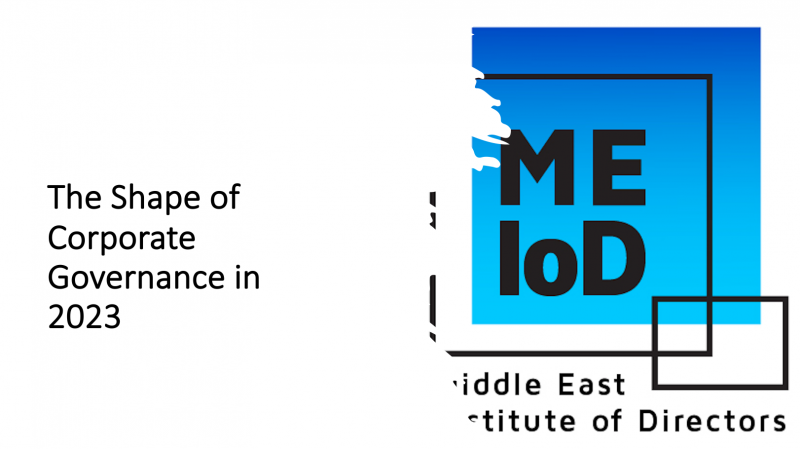The Shape of Corporate Governance in 2023

The Shape of Corporate Governance in 2023
After a challenging few years, as we enter 2023 the outlook for businesses in the Middle East is more optimistic. Focusing specifically on corporate governance, there are a number of developments that look set to further align business practices in the region with global norms and lay the foundation for sustained growth and success. We’ve looked at four specific areas of change which we think will have the greatest positive effect on the state of corporate governance across GCC countries in the coming months.
New regulations supporting the evolution of governance.
The introduction of new legislation pertaining to corporate governance in several GCC countries will further regularise the structure of Middle Eastern business, and the role of directors. This time last year, we reported on the new family business ownership laws enacted in Abu Dhabi, and this year the trend continues, with Saudi Arabia announcing new legislation in the first week of 2023 which addresses the legal framework surrounding company governance.
The regulations are broad in scope, addressing shareholder rights, formalizing the competencies and responsibilities of boards, committees, and executive management, and promoting transparency, impartiality, and equity in the stock market. There’s also a focus on ethics, with specific articles covering the importance of professional conduct and encouraging the implementation of robust accountability and control mechanisms.
Increasing requirement for ESG disclosure and ESG investment.
ESG continues to be a prominent topic and in recent weeks the GCC Exchanges Committee published new, unified ESG Disclosure Metrics — defining a set of standards that align with the World Federation of Exchanges and Sustainable Stock Exchanges Initiative.
The 29 standards address a range of ESG-related issues, including GHG emissions, energy usage, water usage, gender pay equality, employee turnover, gender diversity, data privacy, and ethics. The aim is to standardize ESG disclosure and reporting across the region — and while adherence remains voluntary, we would expect that companies adopting these standards are likely to prove more attractive to global financing and investment bodies.
Professionalization of the role of directors.
The introduction of legislation in several GCC states that places liability on directors for the decisions and actions they take as part of their role has led to an increasing focus on professionalization in the boardroom. Whereas once appointment to a board was seen by some as something close to an honoree post, now many of the board members we speak to at MEIoD recognize the need to formalize their knowledge of corporate governance practices and are keen to undertake relevant training.
This bodes well for the increased effectiveness of boards in Middle Eastern businesses, as directors, particularly the incoming generation, take greater personal responsibility for developing relevant skills and keeping abreast of regulatory change.
Greater focus on the importance of advisory boards
The understanding of corporate governance is broadening beyond the traditional board structure, with more startups and SMEs in the GCC establishing advisory boards to support their executive function, consult on strategy, and bring the benefit of additional sector-specific experience into the company.
As well as providing valuable early-stage guidance in the fundamentals of corporate governance, and opening new avenues for networking, advisory boards play an important role in strengthening the credibility of the company. This is crucial to attracting inbound investment and forming mutually beneficial business partnerships to fuel growth in the region.
The outlook
With corporate governance becoming a more prominent topic for businesses in the Middle East, we expect a positive outlook for 2023. Companies adopting best practices in line with the changes we’ve discussed above will be well placed to take advantage as the GCC economy continues to grow — with GDP in the region expected to rise by 3.6%, as opposed to more pessimistic forecasts for the USA (0.2%) and Eurozone (-0.1%).
For companies, directors, or executives looking to improve their knowledge of newly introduced legislation or standards, or seeking to build their professional skillsets, MEIoD offers a range of courses and workshops on specific aspects of corporate governance, alongside regular webinars based on current topics and trends in the sector.
To find out more, visit https://meiod.org/ or contact info@meiod.org
For More Information:
advisoryServices | capacityBuilding | webinars | knowledgeCenter | A-Look-At-Corporate-Governance-In-The-Context-Of-COVID-19 | Is-it-acceptable-for-a-CEO-to-also-be-Chairperson | 5-ESG-trends-that-should-be-on-your-radar | Corporate-culture-and-the-role-of-the-board | What-does-it-take-to-excel-in-the-boardroom | The-key-drivers-of-effective-corporate-governance | Which-type-of-board-structure-does-my-business-need | The-Importance-of-a-Code-of-Ethics-in-an-Organization | reducing-the-pressure-to-decide-in-the-boardroom | How-future-proof-is-your-board | How-do-you-tell-if-someone-is-qualified-to-sit-in-the-boardroom | What’s-your-position--what’s-your-heading—leading-vs-lagging-indicators | The-value-of-governance-for-SMEs | Getting-started-with-governance:-a-guide-for-SMEs | What’s-on-the-boardroom-agenda-in-2021 | Role-of-CFO-in-the-boardroom | Updates-on-Corporate-Governance-in-the-Middle-East-–-April-2023 | 3-ways-that-corporate-governance-is-crucial-to-sustaining-family-businesses | How-governance-legislation-in-Abu-Dhabi-has-affected-family-owned-businesses | Boards-of-Directors-in-the-GCC:-Navigating-the-Aging-Boards-Issue | Board-Composition-Trends-in-GCC | Politics-in-the-Boardroom:-Navigating-Power-Dynamics-and-Decision-Making | Why-Startups-Need-Independent-Directors:-The-Key-to-Good-Governance-2 | The-role-of-the-chairperson-2 | How-board-remuneration-impacts-company-success-2 | The-value-of-a-family-constitution-for-family-owned-businesses-2 | 6-questions-board-members-should-be-asking-themselves-2 | Case-Study:-Lessons-from-a-Failed-Digital-Transformation-Implementation | 8-ways-boards-can-drive-effective-corporate-governance | How-committees-and-boards-interact-4 | Importance-of-Training-for-Directors | Advancing-Digital-Transformation-and-Cybersecurity-Governance-in-the-Middle-East | Strengthening-Stakeholder-Engagement-and-Communication-Across-the-GCC:-The-Critical-Role-of-Boards-in-Navigating-Shareholder-Activism | about | investors | director-nomination | corporate-governance-reporting | corporate-governance-assessment | 1-to-1-coaching-for-board-members | advisory-board-setup | board-evaluation | family | director-nomination | corporate-secretarial-services | corporate-governance-assessment | 1-to-1-coaching-for-board-members | board-evaluation | corporate-governance-reporting | individuals | director-nomination | 1-to-1-coaching-for-board-members | entrepreneurs | corporate-secretarial-services | corporate-governance-reporting | corporate-governance-assessment | 1-to-1-coaching-for-board-members | board-evaluation | advisory-board-setup | director-nomination
Share article




